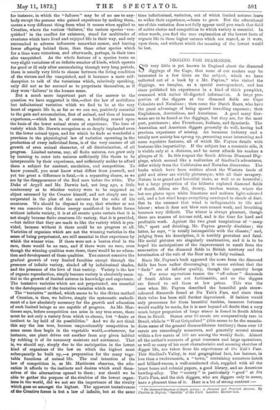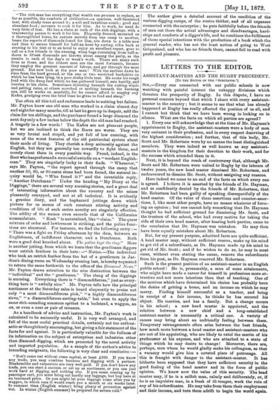DIGGING FOR DIAMONDS.
SO very little is yet known in England about the diamond diggings of the Cape, that some of our readers may be interested in a few hints on the subject, which we have collected out of a book by a Mr. Payton,* who visited the diggings, we imagine, as a special correspondent, and has since published his experiences in a kind of thick pamphlet, crammed with rather ill-digested information. A large pro- portion of the diggers at the diamond fields are Cape Colonists and Natalians ; then come the Dutch Boers, who have the great advantage of being spared travelling expenses ; then Englishmen, Australians, and Americans. A good many Ger- mans are to be found at the diggings, but they are, for the most part, purchasers ; also Frenchmen, Italians, and Spaniards. The Australian and American diggers generally do well, having had previous experience of mining. An immense industry and a totally new society has sprung up, presenting some interesting and some repulsive features, all of which Mr. Payton details with business-like impartiality. If the subject has a romantic side, it is visible only at a distance, and he never affords his readers a glimpse of it. In this respect the South African Diamond Dig- gings, which seemed like a realization of Sindbad's adventures, differ widely from the Californian and Nevadan discoveries. The books which have been written about the Western lands of gold and silver are vividly picturesque, with all their savagery. Nature is so grand and beautiful there, as well as so bountiful ; but a large proportion of the hitherto explored diamond fields of South Africa are flat, dreary, treeless wastes, where the hot sun glares upon white limestone and uniform light-coloured soil, and a hot wind keeps everything enveloped in clouds of dust. But in the summer that wind is indispensable to life and labour ; when it does not blow men cannot work, and breathing becomes very difficult. The winter is always pleasant, though there are seasons of intense cold, and is the time for hard and profitable work. Against the two great temptations of "camp life," sport and drinking, Mr. Payton gravely disclaims ; the latter, he says, "is totally incompatible with the climate," and, judging from his description, it is terribly prevalent and fatal. His social pictures are singularly unattractive, and it is to be hoped his anticipations of the improvement to result from the annexation of the diamond fields to British territory and the termination of the rule of the Boer may be fully realised.
Since Mr. Payton's book appeared the news from the diamond fields has been rather discouraging ; it seems evident that the "finds" are of inferior quality, though the quantity keeps up. For some mysterious reason the " off-colour " diamonds of South Africa are not fashionable, and so the diggers are forced to sell them at low prices. This was the case when Mr. Payton described the beautiful pale straw- coloured diamonds found at Du Toit's Pass, and since then their value has been still further depreciated. If fashion would only pronounce for these beautiful baubles, immense fortunes would readily be made, for it is now beyond all doubt that a very much larger proportion of large stones is found in South Africa than in Brazil. Stones over 10 carats are comparatively rare in Brazil, while in "West Griqualand " (this seems to be the unmelo- dious name of the general diamondiferous territory) those over 10 carats are exceedingly numerous, and generally several stones within a few carats of 100 are among the weekly finds. Almost all the author's accounts of great successes and large operations, as well as many of his most characteristic and amusing sketches of digger life, are taken from his experiences of Du U:oit's Pass. This Sindbad's Valley, in real geographical fact, has become, in less than a twelvemonth, a "town," containing numerous hotels and billiard-rooms, a well-conducted club, supplied with all the latest home and colonial papers, a good library, and an American bowling-alley. The " society " is particularly " good " at Du Toit's Pass, and the rich diggers, who are diggers only in name, have a pleasant time of it. Here is a bit of strong contrast :— * The Diartiond-Diggings of South Africa : a Personal and Practical Account. By Charles A. Payton, " Sarcelle " of the Field. London: Horace Cox. The rich man has everything that wealth can procure to replace, as far as possible, the comforts of civilization—a spacious, well-furnished tent, with shady trees around it; a soft and luxurious couch; good and abundant food ; servants to cook it for him. As to work, he need do very little of that. He has a claim at each of the rich diggings, with a trustworthy person to work it for him. Elegantly dressed, mounted on a thoroughbred horse, he canters merrily from one camp to another, hears the reports of diamonds found for him, sits down to a table now and then to amuse himself for half-an-hour by sorting, rides back at evening to his tent or to an hotel to enjoy an excellent repast, goes to call on a few friends in the evening, when bags containing from half-a- dozen to fifteen diamonds are thrown about among the party, as the results to each of the day's or week's work. There are many such lives as these, and the richest men are the most fortunate, because they employ the greatest amount of labour, and get through the most ground. But now look at the poor man ! With the earliest dawn he rises from the hard ground, or the one or two wretched buckskins on which he has been lying, in a poor shaky little tent. He cooks his rough food with the dung fuel which he has gathered himself, eats hastily, and hurries to his claim. Sometimes shivering beneath the cutting winds and pelting rains, at others scorched or melting beneath the burning sun, still he works on manfully, for he cannot afford to employ any Refire, grudging even the brief time he gives to food and sleep."
Too often all this toil and endurance leads to nothing but failure. Mr. Payton knew one old man who worked in a claim almost day and night for many months, till at last he gave up in despair, sold the claim for ten shillings, and the purchaser found a large diamond the next day only a few inches below the depth the old man had reached. A tragedy in a few words ! The Kafirs are not pleasant people, but we are inclined to think the Boers are worse. They are so very brutal and stupid, and yet full of low cunning, with some of the worst features of the old patriarchal system about their mode of living. They cherish a deep animosity against the English, but they are generally too cowardly to fight them, and merely cheat them in every possible way. Proud, indeed, is the Boer who hasperformed a successful swindle on a "verdant English- man." They are singularly lucky in their finds. " Whenever," says Mr. Payton, "the report spread through the camp that another 50, 80, or 90-carat stone had been found, the natural in- quiry would be, "Who found it ?" and the invariable reply, "Another Dutchman !" Under the heading "My Diary at the Diggings," there are several very amusing stories, and a great deal of interesting information about the country and the mines pleasantly conveyed, and not at all technical. It is evidently a genuine diary, and the haphazard jottings down which picture for us scenes of such constant stirring activity and conditions of life of such entire novelty are singularly effective. The oddity of the names even exceeds that of the Californian nomenclature. " Rush" is naturalized, like "claim." The queer mixture of order and lawlessness is striking, and the police func- tions are abnormal. For instance, we find the following entry :— " There was a fight on Friday afternoon by the dam, between an Englishman, of indifferent character, and a Dutchman. Both were a good deal knocked about. The police kept the ring." Here is another jotting, from which we learn that the gentleman diggers wear ostrich feathers in their hats : —" Notice.—The individual who took an ostrich feather from the hat of a gentlemen in Jar- dine's dining-room on Wednesday evening last, is hereby requested to return the same forthwith to the office of the Diamond News." Mr. Payton draws attention to the nice distinction between the " individual " and the "gentleman." The slang of the diggings is amusing. Everything there is "diamondiferous," just as every- thing here is "awfully nice." Mr. Payton tells how the principal auctioneer at the Saturday sales is heard eloquently to praise not only "a most diamondiferous pick," "a highly diamondiferous sieve," "a diamondiferous sorting-table," but even to apply the same rich-sounding sonorous epithet to a bedstead, a waggon, an ox, or even a coat or pair of trousers.
As a handbook of advice and instruction, Mr. Payton's work is calculated to be eminently useful. It is very well arranged, and full of the most useful practical details, certainly not too enthusi- astic or thoughtlessly encouraging, but giving a fair statement of the facts for and against. It is particularly valuable for the fullness of its information on the subject of enterprises and industries other than diamond-digging, which are promoted by the novel activity and imported population. As a sample of the author's advice to intending emigrants, the following is very clear and conclusive :—
" Don't come out without some capital, at least £200. If you know any trade, you may combine business and digging with a partner. Blacksmiths and carpenters are very well paid. If you don't know any trade, you can start a canteen or set up as auctioneer, or you can just work hard at digging, and nothing else. If you mean coming up by passenger cart, you must bring out hardly any luggage, but buy here at an increased price. Or you might let your luggage Come after you by waggon, in which case it would reach you a month or six weeks later. In summer time (English winter) bring plenty of protection against wet. In winter (English summer) be prepared for severe cold." The author gives a detailed account of the condition of the various digging camps, of the routes thither, and of all expenses connected with the enterprise ; he puts faithfully before the friends of men out there the actual advantages and disadvantages, hard- ships and comforts of a digger's life, and he combines the fulfilment of these special intentions with the production of a book which the general reader, who has not the least notion of going to West Griqualand, and who has no friends there, cannot fail to read with profit and pleasure.



































 Previous page
Previous page